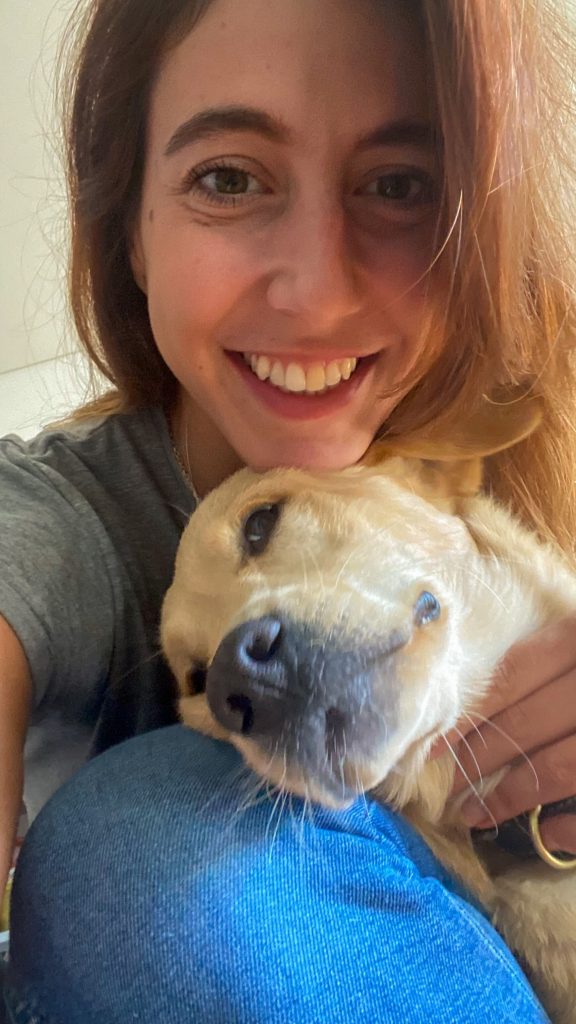David Lockie: So you have joined us as a CSM within the last like, what, three or four months?
This is actually my second month!
DL: It feels like you’ve been here so much longer! So first of all, please tell us what a CSM is at Angry Creative.
A CSM is a Client Success Manager. The unique thing about this role at Angry is that it’s not a typical sales role like most agencies have. CSMs at Angry Creative has the role of starting off with a client, managing them during the whole sales process, making sure that all the contracts and all the right things are sent out in those beginning stages. But then also making sure that the project goes from A to Z. So really taking the client through all of the project management processes, running the sprints, working on the workshops with the clients or doing the audits with the developers in there as well. And essentially, what’s really unique about this role is that you can own a full project right through to actually going live with the website. So you get to really grow with the clients. And you get to build these relationships where you can actually really influence how they think about their business growth. And it’s great because it’s not something that many agencies do.
DL: I guess it’s a very involved role, as it encompasses sort of both the account management and the project management roles I’ve been more familiar with previously. Does that introduce any tension? How do you manage always being an advocate for the client, but also have the company’s interests at heart? If so, how do you manage that tension?
It actually reduces tension I would say. So in my experience in the past, being somebody who’s ultra-focused on sales, you’re looking at really maximising the project budget. In this role you are wearing both hats of a sales or account manager and a project manager, so things can be done differently. What you’re actually doing is managing the budget, and you are thinking about the company, but you’re also thinking about creating a scalable future proof solution. So it feels like it’s a very win-win situation. So rather than actually having the increased tension between these roles, you are reducing the tension. Because you can manage expectations on both sides, you’ve got that intimate connection with developers that are working on this project, and you can understand the project issues on a deeper level, but you’ve also got that intimate connection and relationship with the client. And you are really advocating for them as well. So I feel like it is a very good position to be in.
But it’s also a tonne of work, you need to have an array of skills, you need to be able to be a good salesman, a good project manager, and to be able to manage the times when those roles are clashing.
DL: It sounds like your role takes a lot of judgment, and requires a lot of trust from both the company and the client as well. So that must add to the pressure.
Yeah, realistically, that really does add to the pressure because you do have to manage expectations on both sides. It does require a certain set of skills, that is a challenge to develop. And we’re all naturally better at one thing than the other, and that shows across all the Client Success Managers at Angry. You can see a varied skill set where some of us are better project managers, better with using those project management tools. Some of us have a deeper technical understanding so we can chat to developers on a specific level, whereas some of us are great salespeople and we can sell the big dream, we can do the big workshops. And so it’s great because whichever one of the categories that you fall into, you get to develop the other skills and Angry tries to give you clients that are best suited to the skills that you have.

DL: That’s interesting. I guess that speaks to the size of business we are, which is that we do need specific roles so that the machinery works. But we aren’t so big that the role is predetermined from birth and extremely strict. So it sounds like you’ve got the opportunity to shape the role individually and creatively as well, which sounds like a nice balance.
Yes, I actually love that you can be creative in the role and that you can shout when you’re stuck on certain aspects. So for me personally, what I struggle with is things like the financial aspects. I’ve had to learn a lot about how we do invoicing, I really have to remind myself to check to do invoicing, to make sure that I’m really on top of things like where time has been logged for some projects. So that’s the part that I feel like I’m the least competent so I’m learning a lot with the finance team. I often hang out with them, asking Hannah and Emma to help me understand how these processes work. And actually, side note, it’s really interesting, because now I have a home budget sheet for myself, I’ve learned how to apply invoicing to my life. And I’m trying to figure out how much money I’m spending on stupid things!
DL: What stupid stuff do you buy?
I don’t want to say shoes out loud, but shoes. Yeah.
Anyway, I feel very comfortable in the sales and project management portions of this role. So for me, it’s been really fun to get in a room with a client and dream big. And actually, be able to follow through. Dream big, but then get with the solution architect and create a backlog, which is completely touchable and doable. To see the client get really excited about their dreams being on paper, and their dreams being attached to a budget and a timeline, which makes them more realistic. So that’s the stuff that I’ve really enjoyed and felt more confident doing.
DL: That’s really interesting. One of the things that I do is to keep this collection of quotes, to remind me how to be a better person. And one of them is something like “spending time with the financials helps you deeply understand the business” and I think that’s true, whether it’s business, or your personal budget, or a client project. Humans are very good at telling ourselves stories, and being subjective about things, whereas the numbers are, well, they are far more objective. So when you look at the budget, you can see where you really are, compared to where you think you are.
Yeah, absolutely. One of the challenges that a lot of our clients have is prioritising. So they all come with this thing that they want to achieve, and with a certain budget or a timeline. And it is always a difficult conversation to explain to the client that there’s only a subset of things that can actually get done within their constraints (time and budget usually). It is always a really interesting session that you can have with a client when you talk about priorities. And you find out a lot about them and how they think. That’s great because if you have a project from the start, you can start getting creative around how you can solve their problems within the budget, within the skillset that you have available to you in the team. That’s also another really challenging part of the role, making sure that you’re resourcing for your clients, and then the team. So having the right development team on board, having the right solution architect on board, having that communication flow, having the designers talk to developers, there’s a lot of work there as well.
DL: We’ve covered a lot of ground already. One thing I’ll indulge myself by commenting on is that psychologically, what you want to avoid is this antagonistic feeling where you and the client are staring across the table at each other and trying to solve a problem because that naturally induces us to be antagonistic. The thing that I like about budgeting and allocating priorities is that you can put them on a whiteboard, whether that’s real or virtual, and both sit on the same side of the table and look at solving the problem together. And there’s just something quite fundamental about that reframing, even if you’re essentially trying to do the same thing, it takes some of the egos out of the picture. You both start to act like you’re on the same team working to beat the problem rather than battling against each other.
Yeah, absolutely. And I think the key thing here is that you really have to gain the clients’ trust, right from the beginning. It is about making sure that they know that, yes, you’re working for this company. And obviously, we’re trying to make money, but you are advocating for your client, and the client needs to know this from the start because you are their point of contact when they have a problem, they’re going to come to you when they’re happy, they’re going to come to you when they’ve got a problem. So as a CSM at Angry, you really have to work on that initial trust building with the client. And it’s always much harder if you lose trust, and then have to rebuild it.
DL: Been there, done that! So tell me about a day in your life now.
My day kicks off with a really long dog walk. I do 10 kilometers in the morning, every single day.
DL: Do you run that or walk it?
It depends. I’m actually walking at the moment because my dog’s a bit poorly. I will do runs as well, I do about 100 kilometers a week on average in terms of running.

Then I’ll start working around 8am. I’ll do my emails and notes for the day and I’ll get ready for my stand ups. So every single day, we have two stand ups if you’re a CSM. One of them is the commercial stand up where the whole commercial team including the CEO and the Managing Director who also happens to be my manager comes on. And we talk about any upcoming blockers or problems. So for example, if an issue has come up with a client and you want to grab a developer from someone else, or if you don’t know how to solve a problem, you don’t know how to send a contract, anything like that. Then we solve it as a team, which I absolutely love. So that’s the first meeting of the day for me.
Then the second meeting that I have is always a stand up with my specific unit. At Angry, the way that we’ve structured the company is that we’re divided into different units. It just means that you get to know the developers much more basically, you have a specific development team, you know who’s good at what. And so within each unit, you have a set number of developers and a set number of CSMs so that we’re a smaller team within the bigger company. That second meeting is my unit meeting where we ask every single developer what they’re working on that day if they are stuck. And then if there are any updates from the client, it’s where I come in and give the client updates. That happens every single day of the week. So that’s usually the first hour of my day, in terms of meetings.
Then I will have most definitely a sprint meeting for a client, I have one almost every day if not more than one. So I meet with my clients every single week or every two weeks, and we go through what the tickets are on their board, how things are progressing during the week. It will be an internal or an external meeting. I do both and I keep them separate. So per project, I will have a meeting with my developers and discover any problems there. And then the same thing with the client, so the developers don’t need to sit in client meetings. I will also roughly once a week I’ll have a new lead come in. So I’ll have an initial prospecting call where I can qualify or disqualify the lead, see if they’re a good fit for the company.
Then I’ll have internal meetings. We have a commercial meeting that happens regularly where we look at the big picture, how we’re going to move forward, or going over invoices. Making sure that the right invoices are being sent to the clients and making sure developers are logging time correctly. And then usually a lot of the stuff that happens is developers will have problems during the project. And I’ll get a bunch of slack messages during the day: “this has come up and this is a problem,” and “can you help me and jump on a call,” or “can you get me another developer on here?” So I’ll have lots of impromptu meetings.
DL: Do you have lunch at any point during that day? Or is it just one overwhelming series of meetings?!
There are a lot of Google Meets, but I try to actually have my lunch hour free. I don’t manage it every time. But I will sneak in food during one of the meetings if it’s an internal meeting, and I just apologise. But the reason I do this is because I actually sneak off three days a week during the day between three and five. I teach a class, so I teach this class or go to the gym. So I have another workout session during the day. So I try to replace my lunch with that so that I can eat afterward. Don’t worry, I still get a good balance.
DL: So you hang up your work hat for the day. How do you unwind? Because agency life especially when you’re on the front line with clients and internal teams can be pretty intense. So yeah, like what’s wind down like for you?
Well, wine, David, wine! No, my evenings are either sports, going for another dog walk, I’ll listen to some music, or read – I’m a massive book nerd. I’m very into art history. So I have lots of art books. And I actually like colouring books for adults. So here’s something that most people don’t know about me. Maybe I’ll watch something on Netflix. I’ll do my colouring books. And then if it’s a Friday, I will go out with my friends and have some drinks.
DL: I’ve got fond memories of the party scene in Belgrade from WordCamp.
That was good fun. Yeah. Very, very intense scene here when it comes to going out and stuff.
DL: Awesome. It sounds like a pretty packed day. You must be glad when it’s the weekend?
Yes, I am and I really try to sleep in. But when you have a dog that doesn’t always work out!
DL: Well, dogs are one thing. If you ever have kids then totally forget about it. Yeah. You can always put the dog downstairs.
That’s so true. Can you do that to a child? I don’t know. We’ll find out!
DL: Legally? No. All right. All right. So what would you say is different or unique or unexpected about Angry Creative in contrast or comparison to other places that you’ve worked?
One of the things that I feel is really well done is that there is very strong communication between managers and for the management team and employees. So I feel like that in my case, Amy is my manager, she is the Managing Director of a company, which is, you know, a big role. So she has a lot going on, but it always feels like she has time to solve my problems, which is amazing. So it always feels like someone is there to listen and to support you. So that’s one thing to appreciate. And the other thing I appreciate is that we said this multiple times, but as a CSM, your day never ends so you could literally always be online and still have a to do list. I’ve never had that satisfaction of ticking off my whole to do list so far at Angry. And that’s okay. We’re very open about the fact that you just cannot get everything done. And no one puts pressure on you to do that. The company culture is very understanding. So I really love that as well because I don’t feel like I’m failing, not having completed things, but I feel like that’s okay, I’m supported. If I have a problem, somebody will help me solve it. And it’s okay that I haven’t finished everything in one day. So I love that part and I think that’s a very specific thing for Angry that I haven’t felt at different companies.
I also rely on my unit because rather than having a massive company where you’re working with 100 developers or something, you actually have a unit so you really get to know the people that you work with on projects. So you feel very comfortable when you talk to clients knowing which developer is on your project, if they’re good with clients or if they’re more shy, if maybe you need to help them communicate, you get to know if developers are good at estimating tickets so you can help them, you can nudge them, you can do a little “are you sure thing” with them so it’s good that you get that small family feels within a larger company within the units.
We share stuff about each other, we hang out. We actually chat and joke on Slack, we send each other stuff and it’s just an everyday thing you know? So this sounds very cheesy, but it is a little bit of a work family feel for sure.

DL: That’s nice. Yeah, I think those sorts of human values are a European thing compared to the more US work paradigm, having talked to lots of folks in the industry. Something I’m grateful for!
That’s definitely one of the strong points about Angry: not expecting people to kill themselves for work. It’s a good balance.
DL: Is there anything that you’d like to include?
I think the other thing that we haven’t mentioned is that this role does hold a lot of responsibility. You are responsible for how much money the company makes. Developers will clock in and clock out (I don’t mean this in a bad way obviously), they’ll come in, they’ll do their tasks, when they’ve got a problem they’ll flag it, they’ll estimate and then they can clock out. As a CSM you are responsible for making sure that the clients are bringing in money and that if you make a mistake on an invoice and you miss invoice you have to correct that.
DL: People get agitated about money.
They do! So for anyone thinking about joining in this role, it’s something you have to be comfortable doing, having that responsibility.
DL: Thanks so much Nev, it’s been great talking to you!
If you’re the kind of person who likes to take on responsibilities and work with a company that likes to create more effective websites, please do find out more and get in touch!
